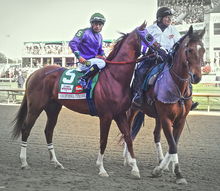Although many people in the horse community are aware of the importance of drug testing of race horses to maintain the integrity of the sport, many people are unaware of the contributions made by the Kenneth L. Maddy Equine Analytical Chemistry Laboratory at UC Davis.

Famous California race horse - California Chrome
California provides robust quality drug testing for horse racing, thanks to collaboration between the Kenneth L. Maddy Equine Analytical Chemistry Laboratory at UC Davis and the California Horse Racing Board.
© 2015 by Bill Brine
In 2014, a Jockey Club-commissioned report highlighted the disparity in quality and consistency across the nationâs state-by-state regulatory system, causing some people in the industry to call the current system unacceptable.
That report also served as a reminder that California, in contrast, provides robust, quality drug testing for horse racing, thanks to collaboration between the Kenneth L. Maddy Equine Analytical Chemistry Laboratory at UC Davis and the California Horse Racing Board.
The Maddy Lab serves as the primary equine drug-testing laboratory for Californiaâs five permanent race courses and seven seasonal fair venues. This testing is conducted to ensure that performance-altering drugs are not administered and that permitted, therapeutic medications are given properly.
California racing generates 25 percent of the national âhandle,â or wagered money, for the racing industry. Unlike some states, California is able to fund its drug-testing program with a portion of the stateâs wagering revenues.
âItâs a big challenge for some laboratories in this country to provide the adequate resources for rigorous drug testing,â said Scott Stanley, professor of equine chemistry at the Maddy Lab. âYou need the newest equipment, highly trained staff, time and resources to develop the best anti-doping methods for detection of illegal drugs. The pari-mutuel racing industry is dependent on the confidence the betting public has in the integrity of racing.â
Named for the late Kenneth L. Maddy, a California legislator, avid horseman and supporter of veterinary education, the Maddy Lab has evolved quickly since it opened in 1999 as part of the California Animal Health and Food Safety Laboratory System at the UC Davis School of Veterinary Medicine. A staff of 16 people runs approximately 70,000 samples a year â looking for evidence of performance-enhancing and other prohibited drugs.
The laboratory is equipped to detect over 1,500 drugs in its routine testing. It was one of the first horse-racing laboratories accredited by the American Association for Laboratory Accreditation and Racing Medication and Testing Consortium, based on the World Anti-Doping Association model.
To get the most accurate test results, the lab runs âpairedâ samples, with blood and urine collected simultaneously for testing. Paired samples cost more to test, however, and not every state can afford to do so. Since 2006, the lab also has used a robust out-of-competition testing program to help protect California racing.
âOut-of-competition testing looks at horses not just on race day, but in the days, weeks and even months leading up to a race,â explained Rick Arthur, equine medical director for the California Horse Racing Board. âTraditional postrace testing is just part of the drug testing picture. Out-of-competition testing is as important in horse racing as it is in human sports because there are performance-enhancing drugs that can be administered well in advance that are no longer detectable at race time.â
Arthur noted that the board was able to increase funding for the drug-testing program at the Maddy Lab in 2006 and is again seeking to increase support to allow for additional drug-testing research and development.
âContinually developing strategies that will detect persons trying to gain an unfair advantage remains one of the California Horse Racing Boardâs highest priorities,â said Rick Baedeker, the boardâs executive director.
Arthur added that for the industry, drug testing must be at the forefront when evaluating horse-racing policy.
âWe, along with others in the industry, support proposals for a centralized tracking of racehorses for out-of-competition testing purposes, reciprocity between regulatory agencies, uniform levels of testing and investment in targeted research,â he said. âDrug testing is not simply a competitive integrity issue for horse racing but is equally important for protecting the health and safety of our human and equine athletes.â
